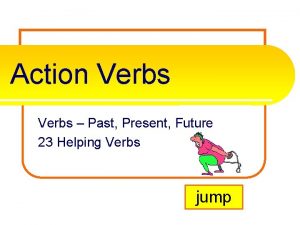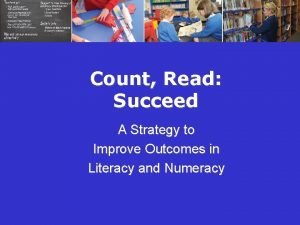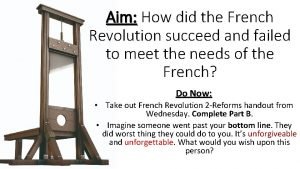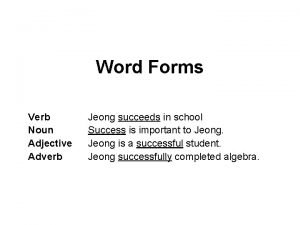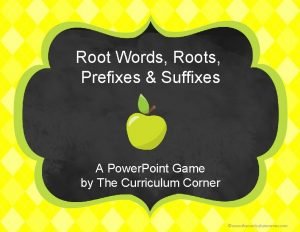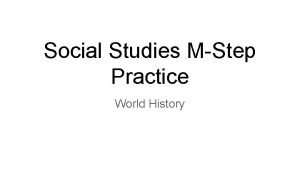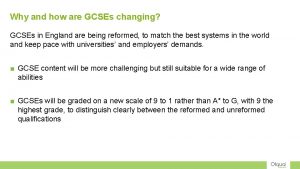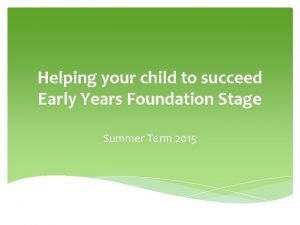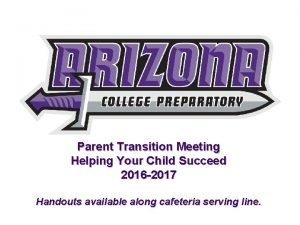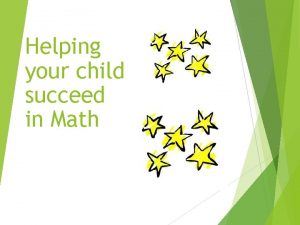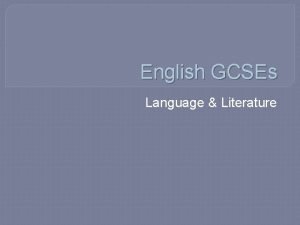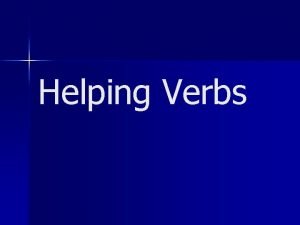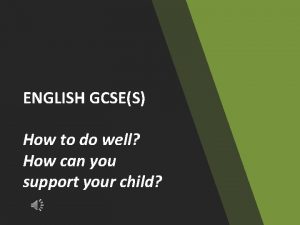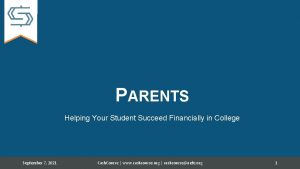Helping your child succeed in the English GCSEs






















- Slides: 22

Helping your child succeed in the English GCSEs Mrs Perry – Head of English Mrs Hall- Key Stage 4 English Coordinator

Tonight • Key Dates • Equipment • The new GCSEs – an overview of Language and Literature • Revision techniques • Seneca Demonstration

Dates Language • Component 1: Monday 9 th December • Component 2: Thursday 23 rd January Literature • Component 1: Completed in Year 10 • Component 2: Monday 27 th January

Equipment • Black pen only – please note that ‘Frixion’ erasable pens are not permitted. • Highlighters should be used – but not for writing an answer. • Watches are a good idea!

New GCSEs: Language Component 1: 1 hour 45 mins (40 %) § Section A: Reading 20 th Century Fiction § Section B: Creative Writing Component 2 ( 2 hours, 60 %) § Section A: Reading 19 th and 21 st Century non fiction § Section B: Writing Non. Fiction Reading AO 1: Reading comprehension AO 2: Language and structural analysis AO 3: Comparing texts AO 4: Evaluating texts Writing AO 5: Structuring and organising appropriate ideas AO 6: SPa. G


Reading: The English GCSE Mantra • FOCUS on the question (highlight the key words to remind you) • TRACK through the text/unseen extract chronologically to show that you have understood it well. • COVER the text extract effectively with lots of textual references.

Key Skills: Language analysis Question: How does the writer present the narrator’s feelings in these lines? Evidence selected: ‘Each breath was an angry little victory. ’ Stronger Analysis Weaker Analysis The narrator feels angry because the writer has used the metaphor ‘angry little victory’ and this makes the reader think about anger. The narrator’s frustration is clearly presented, as even something as simple as a ‘breath’ is presented metaphorically as a ‘victory, ’ indicating that there is some kind of battle or internal struggle taking place. Their frustration is further emphasised by personifying the victory as ‘angry, ’ clearly q Select relevant evidence (and keep it short) demonstrating to the reader q Comment on the effect created and what it that the narrator is makes the reader think. struggling to control themselves. q Apply the relevant terminology (only if there is something to say about it!)

Key Skills: Evaluation Question: How well does the writer present the narrator’s feelings in these lines? Evidence selected: ‘Each breath was an angry little victory. ’ Good Evaluation Poorer evaluation Firstly, the adjective ‘angry’ implies a loss of temper and the noun ‘victory’ suggests success, or winning a battle. Overall, the writer clearly presents the narrator’s feelings in these lines as it is very clear that they feel frustrated. In particular, when they say that their breath is ‘an angry little victory’ it is clear that they are struggling to compose q Start with your overall opinion – engage themselves, as by describing with the question. each breath as a ‘victory, ’ the writer effectively conveys the q Pick relevant evidence and explain how it makes you think/feel/whether you idea that the narrator is agree with the question focus or not. constantly battling with q Concise and relevant language analysis something. will enable access to the top marks.

Component 1, Section B: Creative Writing Sample Questions (45 mins) Choose one of the following titles for your writing: [40 marks] a) Continue the following: It really wasn’t the result I was looking for. b) Grandma. c) Write about a time when you had to go shopping with a relative. d) Write a story which ends: ‘…and I felt so sorry for myself’ 5 mins: Plan 35 mins: Write 5 mins: Check

How can I write an effective story in just 45 minutes? To be able to write a story in 45 minutes, you need to know how narratives are structured. BEGINNING MIDDLE END The problem reaches its worst point (climax) The action increases as characters try to deal with the problem, and other problems that arise (rising action). This takes up most of the narrative. Introduction to the setting and characters (exposition) A problem occurs (complication) The problem is resolved and things return to normal, like at the start of the narrative (denouement) The characters overcome the problem (falling action)


Writing Assessment Communication and Organisation �the writing is fully coherent and controlled �the writing is clearly and imaginatively organised �structure and grammatical features are used ambitiously to give the writing cohesion and coherence �communication is ambitious and consistently conveys precise meaning SPAG �there is appropriate and effective variation of sentence structures �virtually all sentence construction is controlled and accurate �a range of punctuation is used confidently and accurately �virtually all spelling, including that of complex irregular words, is correct �control of tense and agreement is totally secure �a wide range of appropriate, ambitious vocabulary is used to create

How can I help my child revise? Try… • • Encouraging them to read as often and as widely as possible! There will be unseen fiction and non fiction extracts to analyse, so the more that they read, the better. Going through past paper resources at home – these can be obtained from the class teacher or from class charts Asking your child to tell you what is in each paper, what kind of questions they will be asked and how long they should spend on them Encouraging them to attend GCSE Language Lab on a Thursday after school in Rm 156

From the letter home… • GCSE Bitesize provides a comprehensive overview of the skills required for the English Language paper that students can independently work through. This is a simple and straightforward way for your child to revise what is needed for each element: https: //www. bbc. co. uk/bitesize/examspecs/zpxh 82 p • As this paper is based on unseen texts and writing tasks the best revision is practise and exposure to the type of texts and questions they will encounter. With this in mind, students have been completing a homework booklet on Component 1 that they can revise from and improve upon. • And finally – here are two great revision resources: the second one in particular gives good exemplar pieces for the reading section of Component 1 – https: //www. christshospital. lincs. sch. uk/images/PDFS/English/Lang. Revision. Booklet. pdf – http: //www. brockington. leics. sch. uk/wp-content/uploads/revisionguides/englang 1. pdf

GCSE Literature Component 1: Shakespeare and Poetry (2 hours, 80 marks) § Section A: Shakespeare § Section B: Poetry Anthology Component 2: Post-1914 Prose/Drama, 19 th Century Prose and Unseen Poetry (2 h 30, 120 marks) § Section A: An Inspector Calls or Blood Brothers § Section B: Jekyll and Hyde or A Christmas Carol § Section C: Unseen poetry Skills Assessed AO 1: Writing clear points that show a critical understanding of the text and providing relevant evidence to support points made. AO 2: Analysing the language, structure and form of the text and the impact that this has on the reader/audience. AO 3: Demonstrating an understanding of the relevant contexts of texts studied (this is only explicitly assessed for the Poetry Anthology and 19 th Century text). AO 4: SPa. G (this is only explicitly assessed in the longer Shakespeare question and the Post 1914 text).

How can I help my child revise? • Test them on what happens in each of their set texts and when. • Test them on key quotations for key characters, themes and events. • Test them on key context for their Pre 19 th Century text.

From the Letter Home: • GCSE Pod, which the school subscribes to and accessed through RMUnify, has revision resources for all set texts • Seneca Learning (https: //www. senecalearning. com) is a free online revision resource that has revision resources by exam board and text that all learners can use • Mr Bruff playlists on Youtube are an excellent source of revision. Though tailored to AQA, they cover all the key information needed to be successful with Eduqas and have great exemplar essays and tutorials which can be paused for note taking

From the letter home: • GCSE Bitesize is an accessible source of revision material that can be used to cover all the basics. The Eduqas resources can be found here: https: //www. bbc. co. uk/bitesize/examspecs/zw 9 mycw • Oxnotes provides some good resources for An Inspector Calls and Jekyll and Hyde – including important quotations to learn: http: //www. oxnotes. com/gcse-english-literature. html • Spark Notes continue to offer study guides on many of the set texts including A Christmas Carol, Jekyll and Hyde and An Inspector Calls. They can be found by searching here: https: //www. sparknotes. com

Revision Guides Language: CGP’s revision guides Literature: York Notes (9 -1) Globe Education Shakespeare for WJEC Eduqas (published by Hodder) No Fear Shakespeare editions Revision Guides and Workbooks are useful. We will be in touch later this term regarding the purchase of revision guides and workbooks for all set Literature texts and the English Language examinations.

Useful Websites • BBC Bitesize English Language 9 -1 (choose Eduqas): • Course Hero: https: //www. coursehero. com/lit/ - excellent revision notes and infographics for literature texts. • Sparknotes: http: //www. sparknotes. com/ - online study guides for Literature texts, in addition to free online versions of No Fear Shakespeare (see below) • Poetry Foundation: https: //www. poetryfoundation. org/poems - poems searchable by subject and theme, which would be excellent for practising approaching unseen poems • British Library Online: https: //www. bl. uk/romantics-and-victorians - an excellent source of a range of 19 th century texts to support English Language and the poetry anthology. Also excellent sources on Shakespeare. • National Archives: http: //www. nationalarchives. gov. uk/education/ - another good source for contextual information and non-fiction reading. • GCSEPod: https: //www. gcsepod. com - the school has purchased a subscription for this service. It has a wide range of revision podcasts suited for the Eduqas exam board and provides useful revision resources for both the Language and Literature courses. • https: //www. exmouthcollege. devon. sch. uk/page/? title=Key+Stage+4+English&pid=155 • Our department Twitter: @Exmouth_English

Last bit of advice • Questions to ask (on a daily basis) – What paper are you working on? – What literature text are you rereading? – What topics do you struggle with? – What component is that? – Have you looked at the GCSEPod video? – Have you had a go at some practice questions? – Have you asked your teacher for help? – Are you going to the revision sessions?
 Language english
Language english Maybe mr do should have a will
Maybe mr do should have a will How do you help your mother
How do you help your mother What was the congress of vienna? *
What was the congress of vienna? * Count read succeed
Count read succeed Did french revolution succeed
Did french revolution succeed Why did roanoke fail and jamestown succeed
Why did roanoke fail and jamestown succeed Success noun verb adjective adverb
Success noun verb adjective adverb Foxxymolly
Foxxymolly Vivek joglekar
Vivek joglekar The three world order
The three world order 이진트리 복사 순회
이진트리 복사 순회 Give us your hungry your tired your poor
Give us your hungry your tired your poor Hình ảnh bộ gõ cơ thể búng tay
Hình ảnh bộ gõ cơ thể búng tay Lp html
Lp html Bổ thể
Bổ thể Tỉ lệ cơ thể trẻ em
Tỉ lệ cơ thể trẻ em Chó sói
Chó sói Thang điểm glasgow
Thang điểm glasgow Chúa sống lại
Chúa sống lại Các môn thể thao bắt đầu bằng tiếng bóng
Các môn thể thao bắt đầu bằng tiếng bóng Thế nào là hệ số cao nhất
Thế nào là hệ số cao nhất Các châu lục và đại dương trên thế giới
Các châu lục và đại dương trên thế giới

